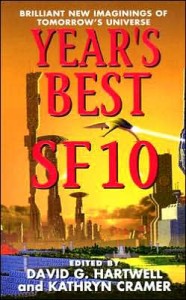 Is it that time of year again already? No, not prom season. Time for the various “Year’s Best” collections to trickle out. This time, it’s the Year’s Best SF #10, as collected by David Hartwell and Kathryn Cramer. As always, the usual caveats apply: selection is at the whim of the editor, your opinions may vary, all criteria are equally valid and subjective. That out of the way, I will note that Hartwell and Cramer have done very well so far in selecting a quality assortment of stories which successfully represent the potential of the field.
Is it that time of year again already? No, not prom season. Time for the various “Year’s Best” collections to trickle out. This time, it’s the Year’s Best SF #10, as collected by David Hartwell and Kathryn Cramer. As always, the usual caveats apply: selection is at the whim of the editor, your opinions may vary, all criteria are equally valid and subjective. That out of the way, I will note that Hartwell and Cramer have done very well so far in selecting a quality assortment of stories which successfully represent the potential of the field.
The lead story is Bradley Denton’s “Sergeant Chip,” which has seen a lot of acclaim since its publication. But then again, how often do you find a story told from the viewpoint of a military-trained, rather intelligent dog whose attention and dedication to both master and orders is so overwhelming? It’s a wonderful story, and the title character can make you believe in the term “Man’s best friend.”
Gregory Benford’s “First Commandment” is, on the surface, a tale about the cataloguing of every species on Earth, and the ultimate completion of said task. Below that, though, is the question of man’s duty to nature, as well as his duty to God. Are we fulfilling an ancient commandment, or have we managed to fail in our greatest task ever?
“Burning Day,” by Glenn Grant, is a cyberpunk murder mystery done in a classic noir-meets-Philip K. Dick style, where appearances are as deceiving as what’s underneath them. Full of twists and surprises, it’s an excellent, crisp story. “Scout’s Honor,” by Terry Bisson, is also a mystery, though something of a time-traveling one. Who’s been sending a scientist a running series of seemingly-fictional journal entries involving a modern man trapped back in the dawn of man’s history?
Gene Wolfe’s “Pulp Cover” is an homage to the lurid magazine covers of the ‘50s, and makes you really wonder, what did all the Bug-Eyed Monsters want with nubile Earth women? One businessman is about to find out, though not firsthand. Ken Liu’s story is even less comforting. In “The Algorithms for Love,” a brilliant toy designer creates a doll that acts so lifelike, it’s hard to distinguish it from the real thing. Unfortunately, her sanity erodes along the way, to the point where reality seems just as predictable as any computerized toy.
Ray Vukcevich’s “Glinky” continues to be a mind-spraining story of collapsing universes, private detectives, mysterious women, and busses, as multi-layered and confusing as the last time I read it. But when realities collide, that’s to be expected. Janeen Webb’s “Red City” is another time-traveling tale, but with a different twist. As the editors say, “there’s a prophet, a harem, a chess game, and a time loop.”
Jack McDevitt looks at what happens when we attempt not just to play God, but to try and improve upon His creations, in a story aptly entitled “Act of God.” Robert Reed’s “Wealth” is the story of an AI whose ability to maintain and handle vast amounts of monetary wealth has given him amazing foresight into the future, a future he has long-ranging plans for. Matthew Hughes’ entertaining “Mastermindless” is the first of his stories featuring freelance discriminator, Henghis Hapthorn. Think Sherlock Holmes in the far future, with a dose of comedy and an AI assistant. Now, for the purposes of this story, strip him of his vast intelligence so he’s forced to solve the case based on what his AI thinks he’d usually do. The solution is right there, all along. I greatly enjoyed this story the first time it appeared, and I’ve been following the subsequent adventures of Henghis Hapthorn ever since.
James Stoddard’s “The Battle of York” is a postmodern, far future myth about American history, chock-full of interesting misconceptions, blended history, and anachronisms. In other words, it’s the past as the future might remember it, and rather fun to read. “The Dark Side of Town,” by James Patrick Kelly, is a futuristic story about domestic strife in a dystopian society where expensive drugs offer a rich fantasy life.
Sean McMullen gives us “The Cascade,” in which a young man becomes accidentally embroiled in a conspiracy to jumpstart a weakened space program at any costs. The decisions he’s forced to make will haunt him for the rest of his life, whether they’re right or wrong. Neal Asher’s “Strood” is all about the perils of communicating with aliens. One man, searching for a cure for his incurable cancer, has accepted an invitation to a distant world, only to discover what seems to be an unthinkable plot against the human race.
“The Eckener Alternative” by James Cambias is a time-travel story with a unique focus: the protagonist keeps trying to change history for the sole purpose of bringing back zeppelins as a viable industry, and his efforts keep going awry. Brenda Cooper’s “Savant Songs” is a quantum romance involving a brilliant autistic woman and her normal assistant, and the secrets they quest for across multiple universes.
Overall, the stories collected in this volume are consistently excellent, with nary a misfire to be found. You’d be hard-pressed to find a better representation of what the science fiction field had to offer for 2004, and I highly recommend this to fans of short science fiction, since I doubt anyone’s read every story in here. Even I found a fair number I wasn’t familiar with.
